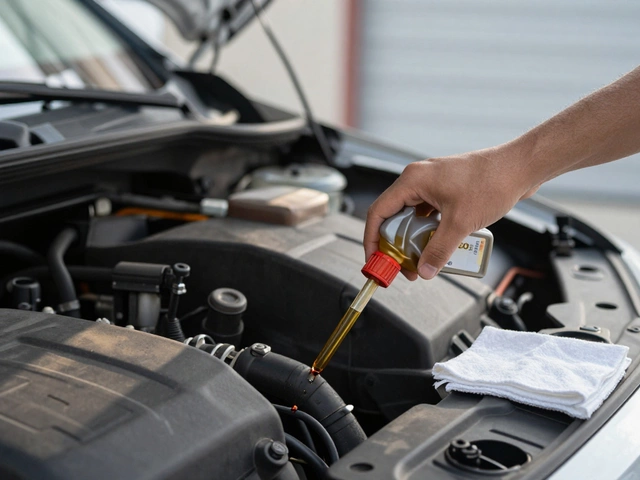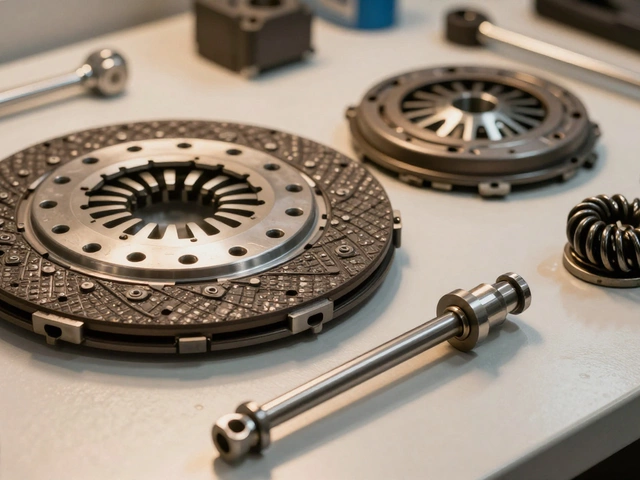
Keeping your car's engine in top health is crucial, and part of that involves ensuring there's enough oil in the system. Just like how our bodies need water to function efficiently, engines need oil for their numerous moving parts. But what happens when your car runs low on oil? Ignoring the signs can lead to bigger problems down the road.
Most drivers know about the typical dashboard warning light, but it's not the only indicator. From strange noises to a drop in performance, there are several signs that your car might be trying to tell you something. Understanding these will not only save time and money but also prolong the life of your vehicle.
In this article, we'll delve into the various symptoms of low oil, the potential risks of ignoring these warnings, and what you can do to prevent low oil from becoming an issue. By staying informed, you can enjoy peace of mind while on the road.
Common Symptoms
Understanding the symptoms of low engine oil can be your vehicle's lifeline. A significant number of drivers don't recognize these symptoms until it's too late. One of the most common indicators of low oil is the appearance of the oil pressure warning light. This light is a direct signal from your engine indicating that oil pressure has dropped below safe levels, which could happen if your oil level is too low. If you see this light glowing on your dashboard, it's crucial to address it immediately rather than brushing it off as a false alarm.
Another symptom to watch out for is engine noise, often presenting itself as ticking or knocking sounds. These occur due to insufficient lubrication, causing metal parts to rub against each other. Without the right amount of oil, the components within your engine's intricate machinery can't glide smoothly, leading to these unsettling noises. If unchecked, this could result in severe wear and tear, gradually degrading the engine's performance and lifespan.
Moreover, if your car's engine begins to run hotter than usual, it may also be a sign of low oil levels. Oil doesn't just lubricate; it also helps regulate the engine's temperature by dissipating heat. When oils run low, the cooling effect diminishes, potentially leading to overheating. In some cases, you'll notice a burning oil smell, a big red flag for immediate attention. This smell usually means that there's oil burning in areas it shouldn't, often due to oil leaking or being spilled onto hot engine parts.
The drop in fuel efficiency is another hidden indicator that often flies under the radar. You might experience a noticeable decline in your car's mileage if your oil is low. Because oil reduces friction between engine parts, without it, the engine has to work harder. This increased effort translates into more fuel consumption. Drivers should monitor their vehicle's mileage and take note of any sudden or gradual degradation. It can save a trip to the mechanic if caught early.
Severe cases might even cause engine performance issues. You could feel a reduction in power, stuttering, or even the engine stalling. The lack of proper lubrication can directly impact the engine's ability to function smoothly. Regular checks of your car's oil level can help preempt any potential disruptions. To avoid these issues, consult your owner’s manual. Ignoring regular maintenance checks is like closing the door on your vehicle’s long-term health.
"Ignoring low oil symptoms is like neglecting a small fire in a crowded building. Sooner or later, it becomes a raging blaze you can't control." — John Turner, Automotive Engineer
Keeping these symptoms in mind will empower you to act swiftly. Identifying low oil indicators promptly can mean the difference between a simple oil top-up and substantial engine repairs. It’s about actively listening to what your car is trying to tell you, ensuring it gets the attention it needs when it needs it.

Dangers of Low Oil
Running low on engine oil is a bit like running a marathon on an empty stomach. Your body will struggle to keep up the pace, and eventually, it just might protest. For your car, low oil levels mean that the essential lubricant which keeps all moving parts in harmony is missing. Without enough oil, the intricate dance of pistons, rods, and bearings starts encountering friction, and here’s where trouble begins. The metal parts grind against each other more harshly, leading to wear and tear that is not just minor. Over time, this can result in parts overheating, warping or even welding together as they lock under the stress. This isn't just a small problem; it can escalate to severe engine damage if ignored.
Low oil indicators are there for a reason, warning us before this friction can do serious harm. A reduction in oil can be due to several reasons – from oil leakage to burning oil within the engine itself. Each of these issues requires immediate attention to prevent long-term damage. One of the first things you might notice when dealing with low engine oil is the unexpected increase in your engine's temperature. The oil serves to cool parts as well as lubricate them. Without adequate lubrication, the heat produced by friction doesn't dissipate properly, resulting in overheating. Increased temperatures can lead to blown head gaskets or even a cracked engine block in severe cases. Imagine your oil like a soothing balm on a scraped knee; it’s essential for preventing damage.
"Low engine oil levels should never be left unchecked," advises auto expert and author John Bridgewater. "The life and efficiency of your car depend significantly on maintaining the correct oil levels, so get into the habit of checking your oil gauge regularly."
Beyond heating issues, expect performance-related changes too. You might feel the engine struggle, hear knocking – none of which you want while driving through busy streets or on a long journey. Knocking is especially concerning as it suggests parts are colliding when they shouldn't be. Over time, this consistent hammering damages the engine internally, leading to a major repair job. When the oil is low, the fuel economy can take a hit as well. Your engine works harder under stress, consuming more energy than usual and causing more frequent trips to the gas station.
Financial Implications
On the financial side, the implications of ignoring oil warning signs can be shocking. Repairing an engine due to neglect of proper oil levels could set you back more than simply maintaining regular oil changes. The cost of replacing an entire engine can run into thousands, an investment most would rather avoid. Additionally, driving with insufficient oil can void any warranties you may have. That's right; neglecting this crucial maintenance step might just push you into a corner when it comes to cashing in on the protections you thought you had.
Automobile experts universally agree that prevention is better than cure. Regular checks on your engine oil levels can mean the difference between a smooth ride and a bumpy road laden with hefty bills. Keeping a watchful eye on potential low oil indicators ensures that your vehicle stays in optimal working condition. Not only is your car protected, but so are your wallet and peace of mind.

Preventive Measures
One of the most effective ways to ensure your engine remains in good condition is to focus on preventive measures. Regularly checking your engine oil levels can help you catch potential problems before they escalate. It's ideal to perform an oil check every month, regardless of whether your dashboard light is on or not. This habit can give you peace of mind, as well as save you a trip to the mechanic. By checking the engine oil consistently, you allow yourself to observe any gradual changes in oil consumption or leaks that could indicate underlying issues.
Always park your car on a level surface before you inspect the oil level using the dipstick. Once the car is parked, ensure that the engine is turned off and has cooled down sufficiently. This prevents you from getting hurt and allows the oil to settle, giving a more accurate reading. If during your check, you notice that the oil appears dirty or gritty, it's a sign that you might need to replace it sooner than planned. Changing your car's oil based on your vehicle manufacturer's recommendation, usually every 3,000 to 5,000 miles, can be essential to maintaining optimal engine function.
It's not just about checking and changing the oil, but also about using the right type of oil for your vehicle. Consult your car's manual for the recommended oil type, as using the wrong kind can affect engine performance. Another preventive tip is to stay informed about your car model's specific needs. For example, certain high-performance engines may require synthetic oil over traditional oil. Proper oil maintenance is crucial for areas with extreme temperatures, as it can prevent oil from thickening in cold weather or thinning when it's scorching hot.
“Regular vehicle maintenance, including oil checks and changes, is the key to maximizing its lifespan and performance,” states automotive expert John Doe from the National Institute for Automotive Service Excellence.Paying attention to your engine's overall health is also imperative. High friction and wear can be combated by using oil additives, providing your engine with additional protection. Keeping an eye on oil pressure gauges and listening to the engine's sounds can give helpful hints if something isn't functioning as it should. Paying attention to these smaller nuances can prevent larger, more expensive repairs down the line.
If your vehicle is used for heavy towing or frequently makes short trips, understanding that it may require more frequent oil changes becomes crucial. Different driving patterns impact how quickly your engine oil degrades, and tailoring your maintenance schedule to suit your driving habits can prevent inadequate oil levels. By implementing these car maintenance strategies, your vehicle will thank you with better performance and longevity, meaning you can continue enjoying your drives with confidence.

Maintenance Tips
Maintaining your car's engine oil level is not just a way to protect your investment but an essential practice for safe and efficient driving. While it might seem daunting to those new to car maintenance, performing regular oil checks can become an easy habit with just a little practice. The foundation of any car maintenance routine is understanding the right way to check your oil and knowing when it's time for a change. To check the oil, make sure your vehicle is parked on level ground and the engine is cool. Pull out the dipstick, wipe it clean, reinsert it fully, and pull it out again to see where the oil level lies between the "min" and "max" marks. If it's on the low side, it's time to add a bit more.
Oil changes are the cornerstone of car maintenance. Most mechanics recommend changing your oil every 3,000 to 5,000 miles, depending on your vehicle's age, make, and model, as well as your driving habits. For those who drive mainly in stop-and-go traffic or on short trips, the need to change oil might be more frequent. It's a simple action that can significantly extend your vehicle's lifespan. The process usually involves draining the old oil, replacing the oil filter, and adding new oil according to your engine's requirements. Sticking to a routine keeps the engine parts lubricated, helps with temperature regulation, and prevents harmful substances from accumulating.
Choosing the right oil is another critical aspect of oil maintenance. Whether you select synthetic, semi-synthetic, or conventional oil, it depends on your vehicle's recommendations and your personal driving style. For example, synthetic oils generally offer better protection against wear and last longer than traditional oils, making them ideal for high-performance vehicles. Even if your car manual suggests a specific oil type, researching the merits of ongoing advancements in oil technology can keep your engine in the best running condition.
"Using the right oil can improve your engine's fuel efficiency by up to 2 percent," says John Nielsen, a renowned car maintenance expert.
Be mindful of common oil-related issues, such as leakage or burning oil, which might point to larger mechanical problems. Always pay attention to any odd car behaviors like rough idling or frequent visits to the gas station, as these can be symptoms of low oil or underlying ailments. If you suspect a problem, it's worthwhile to investigate sooner rather than later - early intervention can save you from expensive repairs down the line. Do not ignore any warning signals and treat them as mother nature's way of nudging you to take a closer look at your maintenance schedule. Also, it is prudent to have a trusted mechanic inspect your vehicle regularly. They can provide a professional eye for details ordinary drivers might miss.
Routine maintenance keeps your car running smoothly, but it's equally important to watch for changes in performance. The way your car behaves on the road can offer hints about its needs, and being in tune with those cues is part of responsible ownership. Listen to your car's 'language,' treat maintenance as a vital ongoing task, and you'll not only improve your vehicle's life but also enjoy every mile more comfortably and worry-free.





